Not Just a Lifeguard Campaign
We love our lifeguards and want to celebrate all that is great about them so we’re running a social media campaign titled, ‘Not “Just” a Lifeguard.’ This campaign aims to highlight the different roles Lifeguards undertake, the skills they develop, and the qualifications they can learn in the role.
Throughout the campaign we will also be showcasing some of our aquatic members and following their career pathways from being ‘just a lifeguard’ to where they are now. Our hopes are that this campaign will shine a light on the incredible mahi our lifeguards do and promote the benefits of working in the aquatics industry. There’s so much more to being a lifeguard than standing and watching the pool.
We’d love your support in sharing this campaign far and wide! You can find downloadable resources below – or feel free to use the template provided and create your own version!
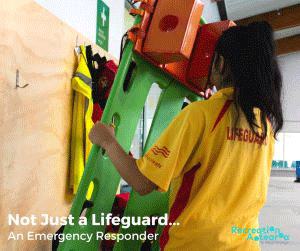
Emergency Responder
Lifeguards are the first responders to emergencies in aquatic facilities, including drownings, earthquakes, building evacuations and lockdowns. Lifeguards who work at Poolsafe pools hold the Pool Lifeguard Practising Certificate (PLPC). To qualify for the certificate lifeguards must complete a swim test, pool lifeguard theory, and aquatic rescues. These are completed via training sessions at an aquatic facility and are followed by 20 hours supervised on th job training. Lifeguards can also complete the New Zealand Certificate in Aquatics (Pool Lifeguard) (Level 3) delivered by Te Mahi Ako.
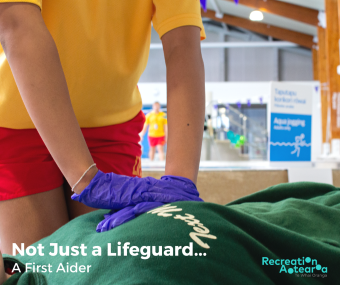
First Aider
All pool lifeguards need to hold basic workplace first aid qualifications and are trained in CPR and the use of defibrillators. In addition, some also train in the use of oxygen and some further advanced first aid qualifications. From nose bleeds to heart attacks, lifeguards are trained to respond.
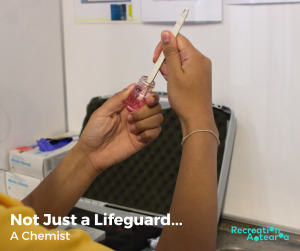
Chemist
A very important part of operating a swimming pool is ensuring the water is hygienically clean for the customers. This involves regular testing and adjustment to the water quality throughout the day to ensure the water meets NZ standards at all times. There are specific chemicals which are added to the water to maintain this quality and lifeguards need to know how to safely store and handle these chemicals. Lifeguards can do either a one-day or three-day course in Quality Water Treatment with various providers throughout the country.
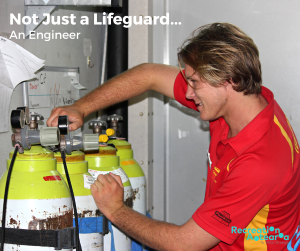
Engineer
Behind the scenes at a swimming pool is a large amount of complex machinery and computer controls which help to keep the water clean and circulating around the pool. This machinery needs to be operated and maintained daily, which requires technical knowledge from lifeguards. The New Zealand Certificate in Aquatic Treatment Systems (Level 4), delivered by Te Mahi Ako, provides lifeguards with a working knowledge of plant operations.
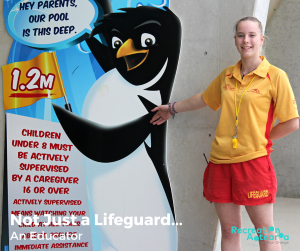
Educator
Lifeguards are responsible for educating the public about the dangers of spending time in, on, or around the water. Lifeguards are not babysitters, but they are there to offer advice and assistance on the best way to supervise children. Constant supervision is key in maintaining children’s safety in the pool environment and this responsibility lies with the parents or caregivers, not with the lifeguard.
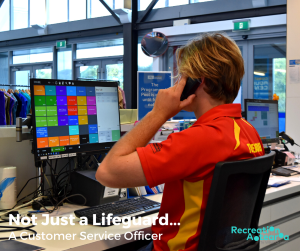
Customer Service Officer
Lifeguards cover the role of Customer Service Officer. For some of the more isolated members of the community, the pool gives them a link to the rest of the world, and the lifeguard can become the friendly face they see every day. Lifeguards manage customer issues daily, facing various scenarios which call for careful listening and problem-solving skills to achieve the best outcomes for everyone. Lifeguards can attend de-escalation courses with specialist providers to teach them how to deal with difficult situations. In some facilities the lifeguards also cover the role of receptionist, where they learn skills such as customer service, administration, and cash handling and accounting procedures.
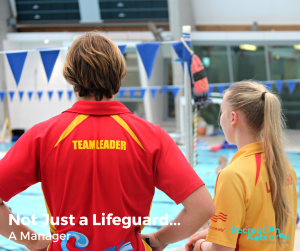
People Manager
At an Aquatic Facility there is a whole team of people working to provide a safe, quality experience for the customer. Lifeguards need to have the ability to work as valuable members of the wider team. As they become more experienced, lifeguards may be responsible for the management, recruiting, and training of junior members of staff. Senior lifeguards can now work towards gaining the New Zealand Apprenticeship Senior Pool Lifeguard (Level 4) delivered by Te Mahi Ako. This is a 2 year on the job qualification which will equip them with the knowledge they need to operate as a team manager.
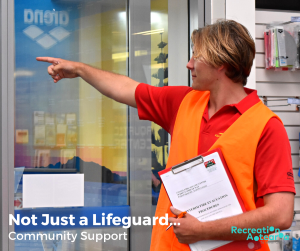
Community Support
Lifeguards are often used by councils as part of civil response. During the COVID-19 pandemic, lifeguards were re-assigned to delivering food parcels or contacting isolated members of the community to check on their welfare. Many lifeguards are volunteers with Civil Defence, ambulance services and FENZ and some have been involved in the emergency response to recent weather events. Emergency management is a component of the New Zealand Apprenticeship Senior Pool Lifeguard (Level 4) delivered by Te Mahi Ako.
Create Your Own Version Template
Want to use photos of your lifeguards? Use the template provided to create a customised version!
Download the template here
